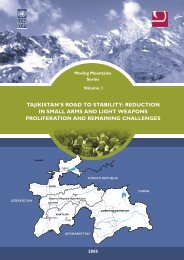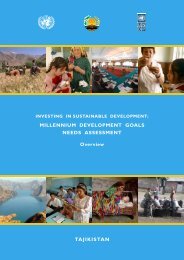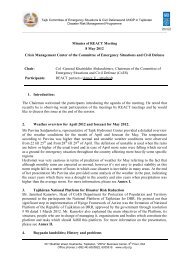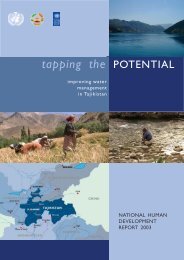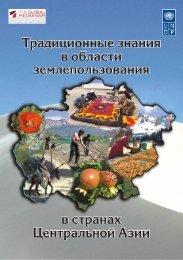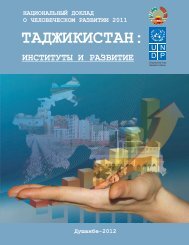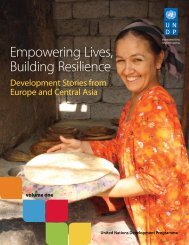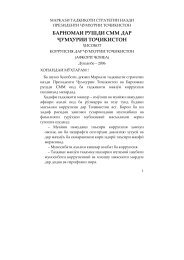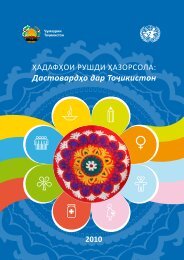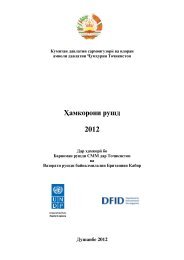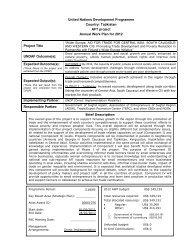Eng - UNDP in Tajikistan
Eng - UNDP in Tajikistan
Eng - UNDP in Tajikistan
Create successful ePaper yourself
Turn your PDF publications into a flip-book with our unique Google optimized e-Paper software.
DEVELOPMENT PARTNER PROFILE<br />
nutritional status of children and women, specifically <strong>in</strong>appropriate family health-care knowledge and practices and the deteriorat<strong>in</strong>g<br />
management and service delivery capacities of the primary health care (PHC) system. A second component of the programme is the<br />
Expanded Programme on Immunization plus which focuses on safe and susta<strong>in</strong>able immunization, and is implemented nationwide. Universal<br />
immunization of children will cont<strong>in</strong>ue to be an <strong>in</strong>tegral part of the Maternal and Child Care programme, with a shift <strong>in</strong> focus to enhanc<strong>in</strong>g<br />
coverage through rout<strong>in</strong>e immunization. The provision of health care, <strong>in</strong>clud<strong>in</strong>g health care facilities, supplies and accessibility has undergone<br />
changes due to the health care reform process which began <strong>in</strong> 2001 through UNICEF’s support to the M<strong>in</strong>istry of Health and has been<br />
progress<strong>in</strong>g with major efforts tak<strong>in</strong>g place <strong>in</strong> 2005 and 2006.<br />
2. Quality Basic Education for All<br />
The purpose of the programme component is to provide quality education through improved school environments, processes, content and<br />
learn<strong>in</strong>g outcomes <strong>in</strong> order to address impediments and constra<strong>in</strong>ts that result <strong>in</strong> low enrolment and drop-outs, especially after fourth grade<br />
and improve the capacity of the educational system. The Programme component has two projects. Project 1, Education for All, which is more<br />
related to policy level work with the education partners. Project 2, Child Friendly Environment, focuses on creation of a gender sensitive and<br />
friendly school environment, through <strong>in</strong>terventions <strong>in</strong> health, hygiene, sanitation and safe water practices <strong>in</strong> priority districts. It also targets<br />
Life Skills Education for adolescent girls. <strong>Tajikistan</strong> still faces the problem of low completion rates of 9 years compulsory education among<br />
girls, as drop-outs and non-attendance become more evident among girls at higher grades. UNICEF directly contributes to the acceleration of<br />
the education reform process at both the national and sub-national level <strong>in</strong> order to provide an enabl<strong>in</strong>g environment for <strong>in</strong>terventions at the<br />
school and community level. Based on the successful experiences of the child participation component <strong>in</strong> the previous country programme,<br />
the <strong>in</strong>terventions will seek to <strong>in</strong>troduce more child centered educational processes through greater child participation. The programme<br />
component will directly contribute to <strong>in</strong>creased access to and completion of basic education, especially for girls, to 90% <strong>in</strong> three oblasts. An<br />
important aspect of the programme is the role of Water, Environment and Sanitation activities which enabl<strong>in</strong>g the creation of gender-friendly<br />
education and school environment, improved sanitary conditions <strong>in</strong> schools encourages girls to return back to the schools as it provides girl<br />
friendly facilities that have security and privacy.<br />
3. Young People’s Health and Participation<br />
Young people of <strong>Tajikistan</strong> face new challenges, <strong>in</strong>clud<strong>in</strong>g an alarm<strong>in</strong>gly <strong>in</strong>creas<strong>in</strong>g transmission of HIV and AIDs, limited opportunities for<br />
participation <strong>in</strong> civil society, and lack of access to life skills education. The Young Peoples’ Health and Participation programme takes place<br />
<strong>in</strong> an environment where families, service providers and decision makers have stereotypes about young people, do not sufficiently understand<br />
problems affect<strong>in</strong>g them, or do not appreciate the potential contribution they could make to society. To empower them to deal with these<br />
challenges and risks <strong>in</strong> a transitional society, the country programme will focus attention on the rights of young people to participation and<br />
well be<strong>in</strong>g, through a separate programme component. The programme component will have a strong focus on youth participation, and at the<br />
same time respond to the global and national priority of prevention of HIV and AIDS. It will provide young people with opportunities to<br />
participate actively <strong>in</strong> civil society and enable them to make appropriate decisions affect<strong>in</strong>g their lives. Young People’s Participation focuses<br />
on build<strong>in</strong>g up youth and child participation forums and networks at the national and sub-national level <strong>in</strong> the 15 priority districts. It also<br />
focuses on child rights, for creation of an enabl<strong>in</strong>g environment for the realization of the rights of the child <strong>in</strong> <strong>Tajikistan</strong>, through formation of<br />
networks of civil society <strong>in</strong>stitutions, media and policy advocacy for the right of children to participate <strong>in</strong> different programmes.<br />
4. Social Policy Reform and Child Protection<br />
The highly centralized social welfare system and the absence of community-based alternatives that respond to families fac<strong>in</strong>g social risks are<br />
key concerns <strong>in</strong> child protection. Many children are deprived of a family environment, while a large number of children with disabilities<br />
reside <strong>in</strong> communities without hav<strong>in</strong>g access to health care and education. Policy makers, service providers and community leaders lack the<br />
capacities needed to address these issues. The programme component will focus on reach<strong>in</strong>g children at risk, such as children com<strong>in</strong>g out of<br />
<strong>in</strong>stitutions, children from broken homes, disabled children and suffer<strong>in</strong>g from violence and substance abuse through creat<strong>in</strong>g alternative<br />
family based care and <strong>in</strong>tegrat<strong>in</strong>g them with families. Changes for children at risk will be the result of a progressive social protection policy<br />
reform to render more effective support to vulnerable families and children <strong>in</strong> need of special protection which has been <strong>in</strong>itiated by the<br />
M<strong>in</strong>istry of Social Protection and Labour with the support of UNICEF. Advocacy for mov<strong>in</strong>g away from the <strong>in</strong>stitutionalized basis of<br />
childcare promoted by the erstwhile state run child welfare system will be carried out, both at the policy and community level.<br />
Future Programm<strong>in</strong>g Direction<br />
UNICEF will cont<strong>in</strong>ue to support Government efforts <strong>in</strong> implement<strong>in</strong>g CRC and CEDAW <strong>in</strong> child and mother survival, protection and<br />
development issues. UNICEF is not <strong>in</strong>volved <strong>in</strong> giv<strong>in</strong>g loans or grants for Programme/project implementation. Its ma<strong>in</strong> strategies are capacity<br />
build<strong>in</strong>g, advocacy and support to service delivery.<br />
UNICEF <strong>Tajikistan</strong> began the implementation of its third country programme <strong>in</strong> <strong>Tajikistan</strong> <strong>in</strong> 2005, with<strong>in</strong> the framework of the United<br />
Nations Development Assistance Framework (UNDAF), and with strong support from the Government and other partners. In all sectors, it<br />
cont<strong>in</strong>ues to focus and contribute to policy level work with the Government, partnership and alliance build<strong>in</strong>g on children and women’s<br />
rights, capacity build<strong>in</strong>g of partners as duty bearers <strong>in</strong> various areas of focus, provision of data and data analysis for improved plann<strong>in</strong>g and<br />
advocacy, as well as overall support to service delivery. Those achievements are highlighted <strong>in</strong> UNICEF technical assistance and donor<br />
coord<strong>in</strong>ation role <strong>in</strong> implement<strong>in</strong>g the government’s Health and Education Sector Strategy Development for National Strategy Development<br />
and the Poverty Reduction Strategy (PRS). UNICEF plays a role or coord<strong>in</strong>ator among donors <strong>in</strong> Education Sector and cont<strong>in</strong>ues to provide<br />
technical expertise <strong>in</strong> Health Sector. As 2007 is a half way thorugh the Country Programme Cycle 2005-2009, The Mid Term Review is<br />
planned, and there might be some changes <strong>in</strong> programme structure. The Country Programme needs to enhance further cross-sectoral synergy<br />
and focus to accelerate the local governance policy support and community based actions.<br />
Source: Aid Coord<strong>in</strong>ation and Project Monitor<strong>in</strong>g System Database<br />
© State Committee on Investments and State Property Management of the RT<br />
109




